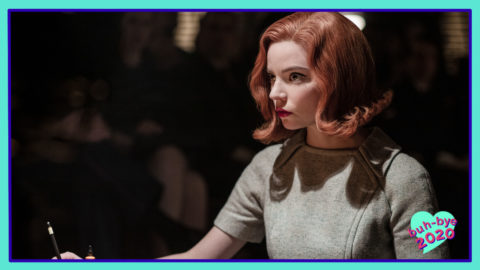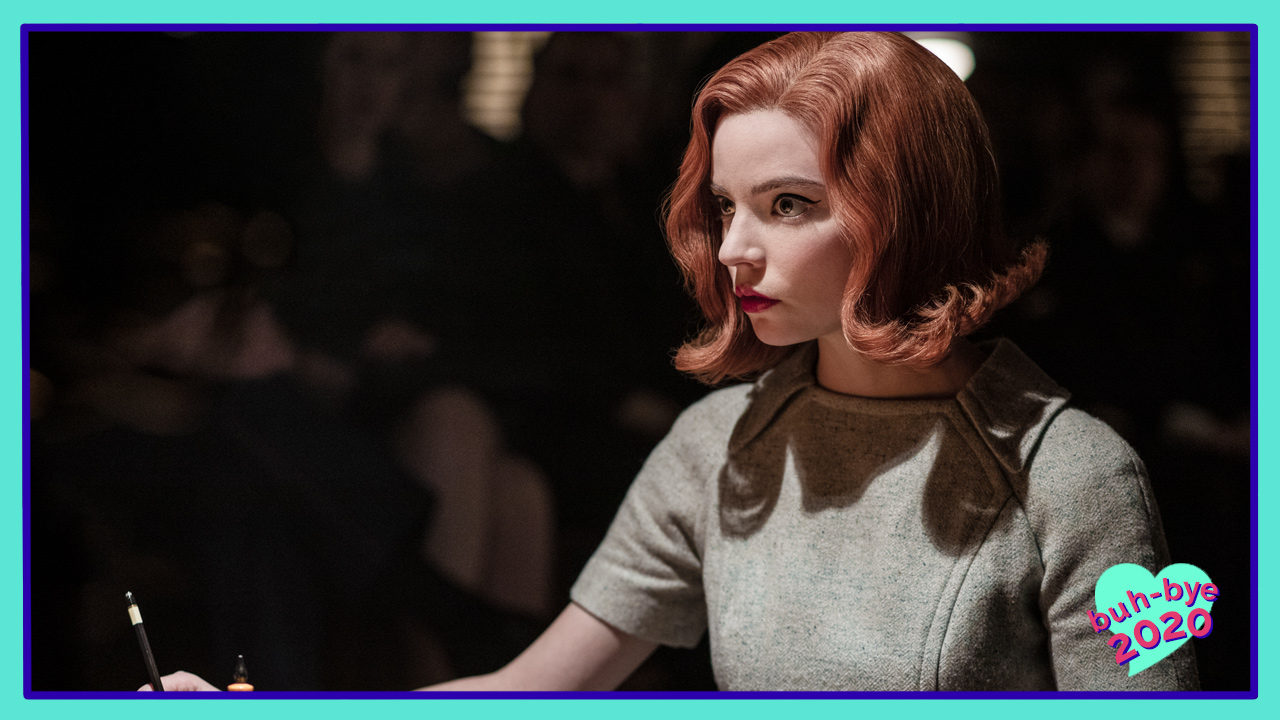2020’s Biggest Shows Offer a Blueprint For How We Should Live in 2021
Schitt’s Creek, Ted Lasso and The Queen’s Gambit present worlds refreshingly free of discrimination

In 2020, we overcame adversity together. Well, in our entertainment, at least.
That may sound overly pat, but in the final months of the Trump administration, with COVID-19 raging across the globe and civil unrest bubbling up in the streets, viewers overwhelmingly turned away from the divisive politics of the era in favour of a simple and comforting moral clarity on screen. We wanted good people to win and find happiness! We wanted racism, sexism and homophobia resolved through sheer acts of will! We wanted to reach across the political divide, shake each other’s sanitized hands and find our common humanity!
We wanted it all to be easy.
So, in a way, it’s not surprising that CBC’s Schitt’s Creek, Apple TV+’s Ted Lasso and Netflix’s The Queen’s Gambit were among the year’s biggest entertainment success stories. Each show is a well-made aspirational tale, buoyed by top-notch performances and constructed with expert precision to tug at the heartstrings. And each offers up a variation of the same, time-tested premise: underdogs succeeding when the odds were seemingly stacked against them. In Schitt’s, it’s a riches-to-rags family learning to be decent in a small, unassuming town. In Lasso, it’s a loveable, down-on-his-luck coach helping to inspire an English football club. In Gambit, it’s a female chess champion’s undeniable talent shattering the 1960s glass ceiling and transcending the cultural barriers of the Cold War.
But perhaps most interesting is how each series has been celebrated for its respective handling of representational issues. Any discussion in the media about Schitt’s has been impossible without the tipping of one’s hat to the show’s exceptional treatment of its central queer couple, David (Daniel Levy) and Patrick (Noah Reid)—the decision to elevate them to romantic leads, surround them with unwavering community support and downplay any perceived differences from their straight counterparts. Topics such as coming out and pansexuality are handled with a deft hand, and those around the couple—in their small, insulated town—are barely phased by queerness. This attitude even extends to the final season’s promotional campaign, which showcased the couple kissing on billboards, the series’ famous motel looming in the background. Creator Levy has gone on the record about his very conscious decision to construct a universe without homophobia: “I have no patience for [it]…. If you put something out of the equation, you’re saying that it doesn’t exist and shouldn’t exist.”
In a similar vein, analysis of Lasso has focused extensively on the creative decision to render the world of professional athletics free of any of the toxic masculinity typically associated with sports narratives. Jason Sudeikis’s Ted has little-to-no patience for aggressive jockeying or professional maneuvering in the AFC Richmond Football Club, short-circuiting even the suggestion of it with a whimsical, folksy form of machismo. Here, women are respected as leaders, men are encouraged to express emotions, and all are treated with an overriding dignity. As one review notes, the series “removes some of the worst factors of the [locker room]—overt sexism, homophobia, emotional and physical abuse—and instead reimagines a space where those dark and dirty behaviors are relics of the past.” Similarly, Colin Chisholm at The Chronicle Herald describes the series as “anti-toxin for toxic masculinity…inhabit[ing] a space famously full of machismo and misogyny and proudly, triumphantly says that’s not cool here.”
And then there’s Gambit. Critics have celebrated the series for its “subtle” and “glossy” handling of feminist politics, allowing lead Beth Harmon (Anya Taylor-Joy) to “climb the ladder of competition [of professional chess in the sixties]…never once trying to be someone she’s not or silence her traditionally girlish traits in order to be taken seriously.” Beth is a prodigy who is acknowledged as a prodigy, even by her male adversaries—with only a passing nod to the social mores of the time, including the challenges that women faced in the pursuit of traditionally masculine endeavours, or the massive cultural rifts brought on by the Cold War. Harmon skates over all of this, or as Monica Hesse puts it in an article for the Washington Post: “[Beth] spends the show navigating a masculine subculture in a misogynistic era…but the danger never materializes; the trope is upended. She didn’t need to watch out for the men. The men, refreshingly, were looking out for her.”
What these shows seem to suggest is that if there is a revolution afoot, it’s a quiet one. Each series reimagines positive outcomes for its marginalized characters, expanding our cultural lexicon to showcase their success over their expected trauma. And in a way, this is a lovely reversal—using the transformative dimensions of fiction to help inspire better worlds by making it all happen now, allowing younger viewers to see the potential within themselves and then bring that world to life. To imagine the possibility that, yes, they can be like everyone else. They can find gay love in a small town, or cry openly in the locker room, or succeed in a male-dominated world.
But in a year where we’ve all been forced to grapple with the realities of systemic discrimination and interrogate our own unconscious biases, I can’t help but worry that (despite intention) all of these series position deep-seated societal problems as matters of personal accountability. The reality is that homophobia does exist in our world, toxic masculinity is pervasive in professional sports (and everywhere, really) and sexism continues to be a problem that women, especially trans women, face. Some individuals are afforded the privilege to ignore these issues in their day-to-day lives, but many are not—as was made brutally apparent during so much of the civil unrest this summer. Many must confront a feeling of difference every single day, and in having these series pretend that these issues don’t exist—that they’re matters that have already been resolved—we fail to acknowledge the underlying systems that continue to perpetuate their existence. We fail to get to the real root of the problem.
Interestingly, three other popular series grappled with identity in more deconstructive ways in their narratives this year—HBO’s I May Destroy You, Lovecraft Country and (honestly, surprisingly) Peacock’s recent Saved By The Bell reboot. Although vastly different on their surface, each offered up the pleasures of their respective genres while also putting forward a similar, potent thesis: In order to move forward, we need to make meaningful changes to the current system. For I May Destroy You’s Arabella Essiedu (Michaela Coel), that is interrogating our cultural understanding of sexual assault, and how society traumatizes and re-traumatizes survivors. For Lovecraft Country’s ensemble, it’s understanding how the inherent power of Black Americans has been obscured and actively suppressed through generations of slavery and police brutality. And for the new Saved By The Bell, it’s the way in which privilege is invisible to the few who have it, and how only a conscious effort can ensure that all students are granted meaningful opportunities.
None of the answers provided by any of these shows are easy, and our heroes often flounder and fail. They analyze their own privilege and take others to task, acknowledging their part in a larger system that disenfranchises many. Victories are hard-won affairs, and are often accompanied by tremendous sacrifice or loss. Our characters wake up each day, and the battle rages on—always a new monster to slay, or a new macroaggression to address.
But in the end, the worlds these shows create are ones to which we can all actively aspire—worlds where we don’t ignore adversity, and where meaningful change happens by rejecting the status quo. And as such, the gains made aren’t just idealized fantasies, but the promise of lived realities.









